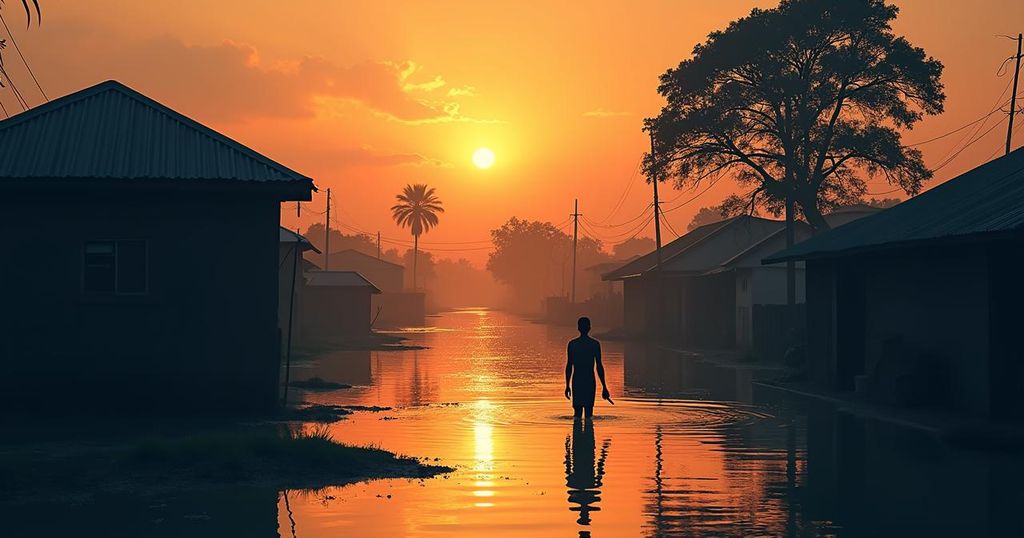Severe flooding in Borno State, Nigeria, has displaced one million people following a dam collapse, worsening an existing humanitarian crisis. Rescue operations are ongoing as local authorities struggle to provide adequate shelter and resources for those affected. The incident marks the worst flooding in the state in two decades and highlights the region’s vulnerability to such disasters.
Recent severe flooding in Borno State, northeast Nigeria, has displaced approximately one million individuals following the catastrophic collapse of a dam. This disaster has exacerbated an already critical humanitarian situation, as thousands of homes were devastated and resources are critically strained. Rescue operations are currently underway, with local authorities working tirelessly to assist displaced residents and provide them with temporary shelters. The flooding, described by the state’s governor as the worst in two decades, occurred after heavy rains caused the dam to overflow, leading to widespread destruction and threatening public health with potential outbreak of waterborne diseases. Al Jazeera’s correspondent Ahmed Idris reported that civilians are engaging in rescue efforts, searching floodwaters with limited diving equipment. Successful rescues have taken place, including the retrieval of infant twins from the waters. As of now, no official death toll has been confirmed, though there have been reports of dead bodies being discovered amidst the efforts. The Vice President of Nigeria, Kashim Shettima, has pledged support in the form of food, shelter, and medical supplies to those affected; however, there is an alarming shortage of materials reaching those in need. Governor Babagana Zulum emphasized the extent of the flooding, stating that a significant portion of Maiduguri, the state capital, has become inundated. The ongoing humanitarian crisis in Borno is compounded by over a decade of violence from the Boko Haram insurgency, which has led to the deaths of over 35,000 individuals and displaced approximately 2.6 million throughout the region. The National Emergency Management Agency previously reported similar flooding incidents this year, which have resulted in the loss of 229 lives and further displacement of communities.
The situation in northeast Nigeria is rooted in a combination of environmental and socio-political factors. The region has faced immense challenges prompted by the Boko Haram insurgency, which began in 2009 and has resulted in widespread violence and displacement. The humanitarian crisis is characterized by a lack of basic necessities, limited healthcare access, and inadequate shelter. Additionally, seasonal heavy rains contribute to flooding incidents that compound these issues, placing further stress on an already vulnerable population. This recent flooding event following the dam collapse is the latest in a series of environmental catastrophes affecting the area, highlighting the urgent need for effective disaster management and humanitarian assistance.
The flooding in Borno State represents a significant humanitarian disaster, impacting one million residents and exacerbating an ongoing crisis stemming from both environmental and socio-political challenges. With the dam collapse highlighting infrastructural vulnerabilities, the Nigerian government and humanitarian organizations face critical obstacles in delivering essential support to those displaced. Significant efforts are necessary to address immediate needs and to implement long-term solutions to prevent future disasters. The resilience of affected communities remains central to recovery efforts, but urgent international and local support is required to alleviate the devastating consequences of this disaster.
Original Source: www.aljazeera.com






